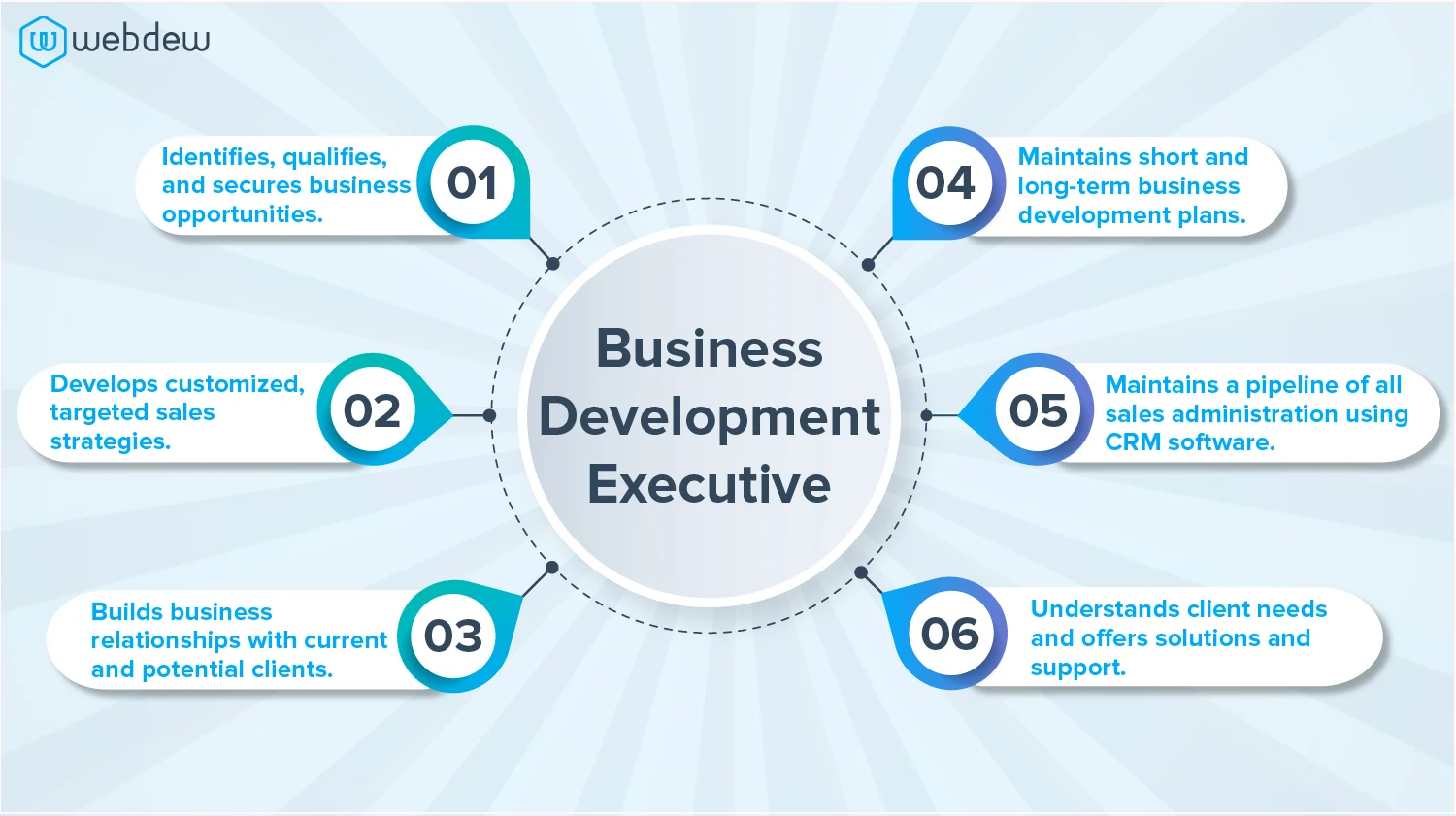
- jaro education
- 9, June 2024
- 10:18 am
A Business Development Executive (BDE) is usually the most important position in the continuation of a company. They find out the need for new business opportunities, build customer relationships, and contribute to revenue growth. A BDE strategizes the marketing policies and applies them in the firm. This is carried out through market research in addition to laying down the sales strategy. He often cooperates with the sales and marketing team to ensure the company’s products and services attract potential clients’ attention.
This blog aims to offer comprehensive insights into the salary landscape for Business Development Executives in India in 2024. By examining various factors that influence salaries, such as industry, location, experience, and company size, we aim to provide a detailed overview that can guide BDEs in their career planning and salary negotiations. Additionally, this blog will serve as a valuable resource for employers looking to benchmark salaries and create attractive compensation packages to secure the best talent in the market.
Role and Responsibilities of a Business Development Executive
The business development executive holds the crucial position of driving a company’s growth and expansion. Business development executives identify new business opportunities, build client relationships, and develop strategic plans to meet and surpass organizational goals.
Table of Contents

Key Responsibilities and Daily Tasks
- Identifying Business Opportunities: Research and identification of markets, clients, and partners that can extend the company’s reach.
- Client Relationship Management: Relationship building while maintaining good relationships with both potential and existing clients; to establish loyalty and long-term partnerships.
- Sales Strategy Development: Designing and implementing sales plans and strategies to hit revenue targets and business objectives.
- Market Research and Analysis: Conducting market research to keep up with the trends that are occurring in the industry, the activities of the competitors, and the inclinations of the customers.
- Lead Generation and Follow-Up: Reaching out and maintaining leads from varied sources, such as cold calling, networking, and industry events, until the point of being converted into business opportunities.
- Proposal and Contract Management: Business proposal preparation and presentation to the client, negotiable terms, and the conditions of contracts and their management.
- Collaborating with all internal teams: Work very closely with all departments, including sales, marketing, and product development, to ensure complete alignment and effective implementation of business strategies.
- Performance Monitoring and Reporting: Monitoring sales performance; analyzing data; and preparing reports measuring the success of business development activities.
Skills and Qualifications Required
- Educational Qualification: When considering educational qualifications for roles like business development, having a Bachelor’s degree in fields such as business administration, marketing, or related areas is often a solid foundation. Additionally, obtaining an extra degree or certification in business development, especially from institutions like Jaro Education, can significantly enhance one’s skill set and marketability. This combination of academic credentials and specialized training from institutions like Jaro Education can pave the way for a successful career in business development roles.
- Sales and Negotiation Skills: Good sales and negotiation techniques secure deals and business acquisitions.
- People Skills: Strong verbal and written communication skills to interact properly with clients, partners, and internal teams.
- Analytical and Research Skills: Ability to analyze trends in the market, identify opportunities, and make decisions in line with the data.
- Relationship Building: Ability to establish and maintain positive relations with clients and stakeholders through strong interpersonal skills.
- Strategic Thinking: Can conceptualize and implement plans of action that are strategic and will help the organization achieve its goals.
- Self-starter and actuate: somebody who identifies opportunities and is capable of driving business growth on their own without constant supervision.
- Time management: Being in control over workloads and priorities through excellent organizational skills will ensure one can handle several varied activities without stress.
Importance of BDEs in Business Growth and Development
Business Development Executives play a pivotal role in driving a company’s growth and success. Their efforts in identifying and capitalizing on new business opportunities directly impact the company’s revenue and market presence. By building strong client relationships and developing effective sales strategies, BDEs help companies expand their customer base and increase their market share.
Their insights and analysis of market trends also inform strategic decisions, enabling companies to stay competitive and adapt to changing market conditions. Overall, BDEs are essential for sustaining long-term business growth and ensuring the company remains dynamic and forward-thinking.
Factors Influencing BDE Salaries in India
Several factors influence the salaries of Business Development Executives (BDEs) in India, shaping their earning potential. These factors include industry variations, company size, geographic location, experience, education level, and market demand and supply dynamics.
Industry and Sector Variations
-
- High-Paying Industries: Industries like technology, finance, pharmaceuticals, and consulting typically offer higher salaries for BDEs. These sectors value strategic business development due to their competitive nature and the high stakes involved.
- Moderate-Paying Industries: Manufacturing, healthcare, and education sectors may offer moderate salaries. These industries also require effective business development but may have more standardized salary structures.
- Lower-Paying Industries: Retail, hospitality, and non-profits generally offer lower salaries for BDEs. While essential, business development in these sectors may not command the same premium as in high-paying industries.
Impact of Company Size and Reputation
-
- Large Corporations: Established companies and multinational corporations often provide higher salaries and comprehensive benefits packages, including bonuses, health insurance, and retirement plans, to attract and retain top talent.
- Small and Medium Enterprises (SMEs): SMEs may offer competitive base salaries but often supplement them with performance-based incentives, profit-sharing, and opportunities for rapid career advancement.
- Startups: Startups may not offer the highest base salaries but often compensate with stock options, flexible working conditions, and the potential for significant career growth as the company expands.
Geographic Location Differences
-
- Metropolitan Areas: Cities like Mumbai, Delhi, Bangalore, Hyderabad, and Chennai tend to offer higher salaries for BDEs due to the high cost of living and the concentration of major industries and corporate headquarters. These cities also have more opportunities for professional networking and career advancement.
- Non-Metropolitan Areas: Smaller cities and rural areas generally offer lower salaries but can provide other benefits such as lower living costs, less stressful work environments, and a better work-life balance.
Experience and Education Level
-
- Experience: BDEs with extensive experience, particularly those with a track record of successful business development, can command significantly higher salaries. Senior BDEs and those in leadership roles often earn premium compensation packages.
- Education: Advanced degrees such as an MBA or specialized certifications in business development, sales, or industry-specific qualifications can lead to higher salary offers. Continuous professional development and training are also valued.
Demand and Supply Dynamics in the Job Market
-
- High Demand: The compensation packages increase where the demand for skillful BDEs is strong—particularly in industries that are growing very fast or emerging. Companies would be willing to pay a premium salary to attract and retain top talent that could make a difference in growing the business.
- Oversupply: In the event that there are more candidates for BDE positions, salaries could become relatively competitive. Employers have a greater choice of talent, which may serve to moderate the level of salaries.
- Economic Factors: General economic conditions, as well as industry-specific trends, are other critical drivers in setting the dynamics of salaries. Economic growth, technology, and regulatory changes can change the demand for BDEs and, in the process, their compensation.
By understanding these factors, both job seekers and employers can better navigate the job market and make informed decisions about compensation and career development in the field of business development.
Average Salary of a Business Development Executive in India
In 2024, the compensation for Business Development Executives in India reflects a broad spectrum influenced by industry, experience, and geographic location. Typical earnings encompass a wide range, highlighting the diverse opportunities within the field.
National Average Salary Range for 2024
-
- Current Salary Data: As of 2024, The salary range for Business Development Executives in India spans from ₹1.7 Lakhs to ₹7.0 Lakhs annually, with an average yearly salary of ₹3.8 Lakhs. This range includes base salary and excludes additional incentives such as bonuses and commissions.
- Variations: Salary ranges can vary widely depending on the industry, company size, location, and the individual’s experience and qualifications. High-demand sectors like technology and finance often offer salaries at the higher end of this range.
Additional Benefits and Perks
Additional benefits and perks significantly enhance the overall compensation package for Business Development Executives. These incentives contribute to job satisfaction, employee retention, and overall financial well-being.
Common Additional Benefits:
-
- Bonuses: Performance-based bonuses reward BDEs for meeting or exceeding sales targets and contributing to company growth.
- Commissions: Many BDEs receive commissions as a percentage of the sales they generate, providing a direct incentive to drive business success.
- Health Insurance: Comprehensive health insurance plans, including medical, dental, and vision coverage, are often part of the benefits package.
- Retirement Plans: Contributions to retirement savings plans, such as the Provident Fund (PF) or National Pension System (NPS), help employees plan for their future.
- Paid Time Off: Generous vacation days, sick leave, and paid holidays support work-life balance.
- Professional Development: Funding for courses, certifications, and training programs helps BDEs advance their skills and careers.
- Travel Allowances: For roles requiring frequent travel, companies often provide travel allowances, company cars, or reimbursements for travel expenses.
- Flexible Working Hours: Flexibility in working hours or remote work options can be an attractive benefit, especially in today’s evolving work environment.
-
- More Financial Security: The bonuses, commissions, and retirement plans increase the financial security and overall earnings of the BDEs, which is very significant in many instances as part of their total remuneration.
- Improved Job Satisfaction: Comprehensive health care insurance, paid annual leaves, and professional development opportunities all contribute to higher job satisfaction as employees view themselves as valued and supported.
- Attraction and retention: Proper benefits packages enable the attraction of a well-qualified workforce and the retention of experienced professionals. This minimizes the rate of turnover, as a firm that provides a comprehensive benefits package can retain its employees.
- Work-life balance: Benefits like flexible working hours and paid leave to maintain a healthy work-life balance, which is extremely critical to increasing productivity while at the same time decreasing burnout.
- Career growth: professional development opportunities not only enhance the skills of an individual but are a path toward career advancement and attract ambitious professionals to the role.
Overall, the additional benefits and perks offered to BDEs play a significant role in their overall compensation and job satisfaction, making these positions more attractive and rewarding.
Career Growth and Salary Progression
Career growth and salary progression are crucial aspects of a
Business Development Executive‘s professional journey. Understanding the typical career path, how salaries increase with experience and promotions, and the potential for lateral moves to other roles can help BDEs plan their careers strategically and set realistic goals. Employers can also benefit by creating clear career development paths and competitive compensation packages to attract and retain top talent.Typical Career Path for BDEs:
-
- Entry-Level Business Development Executive: Starting as a Junior or Associate BDE, professionals learn the basics of business development, including market research, lead generation, and initial client interactions. This stage is crucial for building foundational skills and understanding the company’s products and services.
- Mid-Level Business Development Executive: With 3-7 years of experience, BDEs take on more responsibilities, managing client accounts, developing strategies, and leading projects. They often move into roles such as Business Development Manager or Senior BDE, where they drive significant business growth initiatives and handle complex negotiations.
- Senior Business Development Executive: Senior BDEs, with over 8 years of experience, hold leadership positions, managing larger teams and client portfolios. They often advance to titles such as Business Development Director or Vice President of Business Development, playing a key role in shaping the company’s strategic direction.
- Executive Roles: At the highest levels, BDEs may transition to executive roles like Chief Business Development Officer (CBDO) or Chief Sales Officer (CSO), where they influence overall company strategy and growth initiatives. These positions require extensive industry knowledge, strong leadership skills, and a proven track record of successful business development.
-
- Sales and Marketing: BDEs can transition to sales roles, such as Sales Manager or Account Manager, leveraging their client relationship skills. These roles often offer similar or higher salaries, depending on the commission structure and performance-based bonuses.
- Product Management: With their market insights, BDEs can move into product management roles, contributing to product development and strategy. Salaries in product management can be competitive, often higher than mid-level BDE positions, reflecting the strategic importance of these roles.
- Consulting: BDEs with strong analytical and strategic skills can shift to consulting roles, advising businesses on growth strategies. Consulting positions often come with higher salaries and diverse opportunities for career advancement, making this an attractive option for experienced BDEs.
- Entrepreneurship: Experienced BDEs may choose to start their own businesses, utilizing their skills in business development to grow their ventures. The financial outcomes can vary widely but offer the potential for substantial rewards, depending on the success of the business.
Understanding the typical career path and salary progression for BDEs helps professionals plan their career trajectories and set realistic goals. Employers can also use this information to create clear career development paths and competitive compensation packages to attract and retain top talent.
Conclusion
The role of a Business Development Executive (BDE) is evolving, with competitive salaries reflecting the strategic importance of their contributions. In 2024, BDEs can expect a promising compensation landscape, further enhanced by various benefits and perks. Career progression offers significant opportunities, from entry-level to senior and executive roles, each with increasing responsibilities and rewards.
As demand for skilled BDEs continues to grow, the future looks bright for professionals in this field. Emerging industries and technological advancements will open new avenues for career advancement and financial growth. For aspiring BDEs, focusing on skill development and continuous learning is key to capitalizing on these opportunities and achieving success in this dynamic and rewarding career.








